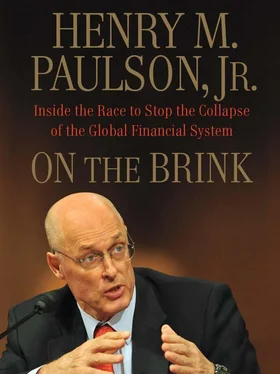McCain struck a positive note, saying that the House Republicans were willing to talk if some of their ideas—he stressed the insurance plan in particular—were considered. “We need to come up with some way to let them get something,” he said.
Still, McCain had put himself in a sticky spot. The first presidential debate was scheduled for that night, and the Obama campaign appeared to have outmaneuvered John. When he’d suspended his campaign on Wednesday, McCain had called for the debate to be postponed to focus on cutting a rescue package deal. Obama had refused, scoring points by questioning why someone who wanted to be president couldn’t manage to both negotiate a compromise and run a campaign. Shortly after we spoke, McCain’s team announced that he would fly down to Oxford, Mississippi, for the debate.
All day I worked the phones, talking with Senate and House leaders, trying to get some traction on the issues in dispute while a Treasury team entered into a negotiating and drafting session with staff from multiple congressional committees. Wachovia’s shares fell relentlessly while its credit default swaps more than doubled to 1,560 basis points. Morgan Stanley moved back into the danger zone: its CDS had soared past the 1,000-basis-point mark.
I caught only part of the first presidential debate that night, but I was pleased to see that neither Obama nor McCain tried to score political points at TARP’s expense. Maybe, I hoped, the polarized parties would be able to come together long enough to do what was needed to save the system.
Saturday, September 27, 2008
I had planned to return to Treasury early Saturday morning, but Kevin Fromer told me to stay home. “Rest up,” he said. “We’ve got to narrow the open issues down and get the agreements on paper.” He was certain that however rough it might still be, we had the makings of, as he said, “a piece of legislation.” His self-assurance rubbed off on me.
I was working in the sitting area of my bedroom when Nancy Pelosi phoned to raise a potentially contentious issue. The Speaker didn’t like the idea of taxpayers’ being on the hook for any part of this bailout, and she suggested taxing the financial industry so the government could get back any money it spent. This was the first I’d heard of this idea, but I could tell Nancy wasn’t trying to complicate the negotiations—clearly, she was having trouble with her caucus. But there was no way that the markets would accept her proposal. It would be like trying to save and punish someone at the same time. I told her I strongly disagreed with her idea but that I would work with her to find a solution. I hung up confident that we could do just that.
We were scheduled to work through the major open issues with congressional leaders that afternoon, but both the composition of the group and a free-for-all format spelled trouble. The key to legislation is getting the right people in the room. I wanted to keep it small and simple, and the Republicans agreed to send one representative from each chamber. But Senate Democrats were clamoring to be involved, and House Democrats also wanted their key players on hand. As the Banking Committee chair, Chris Dodd was the lead Senate negotiator. But Max Baucus wanted to weigh in on compensation; an increasingly assertive Chuck Schumer was taking the lead on TARP tranching; chairman of the Senate Budget Committee Kent Conrad was focused on oversight and insurance; and Rhode Island senator Jack Reed pushed the Democrats’ idea of taking equity warrants in companies that sold illiquid assets.
We arrived at the Dirksen Senate Office Building at about 2:00 p.m. and gathered in the vice president’s office for last-minute preparations before we headed up to Nancy Pelosi’s conference room and that same long table where, little more than a week before, Ben Bernanke, Chris Cox, and I had made our case for quick congressional action. Kevin Fromer, Neel Kashkari, Bob Hoyt, and I sat between Judd Gregg and Roy Blunt, the lead negotiators on the Republican side, facing House and Senate Democrats. Perhaps 30 staff members lined the walls.
Mitch McConnell had put Gregg in charge of Senate GOP negotiations when Richard Shelby elected to sit out the debate. It was a fortunate, and inspired, choice. Judd was a respected New Hampshire conservative who possessed one of the sharpest minds in the Senate, knew the issues cold, and was a superb negotiator; he commanded the respect of Senate Republicans. He understood that the system was endangered and wanted results. Roy Blunt had taken Spencer Bachus’s place at the table, and this, too, pleased me. The Missouri congressman was a careful listener with a smooth manner, who would do a good job of representing House Republicans. Like Gregg, he knew we needed to get something done.
Chris Dodd opened with remarks about the importance of bipartisanship. I began by noting the increasing length of the proposed legislation and made clear we would not accept a bill that couldn’t work. The three-page outline we had sent up to the Hill had turned into a 40-page bill under Dodd and Barney Frank the previous weekend. Now it was more than 100 pages.
“We want to adopt something that works, but there is resistance within our caucuses,” Barney said diplomatically. He represented House Democrats, along with Rahm Emanuel. Charlie Rangel also attended.
It didn’t take long for the meeting to start getting out of hand. There were frequent interruptions, and people seemed unwilling to negotiate. We began with a contentious issue: executive compensation. Baucus and Frank were the main proponents of the Democratic view, but everyone had an opinion. Some, like Baucus, wanted to limit tax deductibility on the executives’ pay. Others wanted to be able to claw back compensation that was awarded on the basis of inaccurate financial statements. Schumer led the attack on golden parachutes, those generous payouts often given to fired or retiring executives.
I wasn’t about to defend golden parachutes, but we needed a solution that worked. Our priority was to buy assets quickly from as many banks as possible. To help make that happen, we wanted clear, easy-to-execute rules that would encourage participation. So I pushed to exempt smaller institutions from the rules while resisting the more complex compensation formulations that might deter bigger banks or be difficult to execute. I thought our stand made sense: we had been tough so far, forcing the CEOs of Fannie Mae and Freddie Mac to leave without their golden parachutes. By contrast, the Democrats were understandably looking for something that they could trumpet to reduce the political backlash they saw coming.
Two nights before, Chris Dodd had run an orderly meeting, and we’d made real progress on many thorny issues. This meeting, however, was becoming increasingly loud and chaotic. Soon, perhaps in frustration at my stance—or just to be heard above the din—Baucus began yelling at me.
“Hank, you’re alone on executive comp. I’m not one to threaten, but you have to listen.”
We got word from outside the room that the press was already reporting on the scene inside. It was outrageous. Here I was dealing with a room full of Senate Democrats competing with one another to pound on me, while their staffers leaked to their press contacts, oblivious as to how that might affect the markets we were trying to save. We complained, and Rahm Emanuel acted quickly, confiscating the staff members’ BlackBerrys. It reminded me of the Old West, where everyone had to check their guns in at the saloon.
Rahm was looking for a solution, and he bluntly summed up the dilemma on executive compensation. “You need your market to work, and we need ours to work,” he said. “Golden parachutes are a problem.”
Читать дальше












